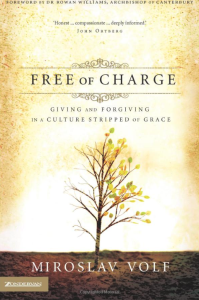Book Review: Free of Charge
Robert+ Balfour
 The verbs “give” and “forgive” are two of the cornerstones of Christian faith and practice. Jesus is a gift from God and the source of all forgiveness between God and people. Moreover, he highlights the importance of God’s generosity and eagerness to forgive when he teaches his disciples to pray in Matthew 6:11-12, “Give us this day our daily bread, and forgive us our debts, as we also have forgiven our debtors.” (ESV)
The verbs “give” and “forgive” are two of the cornerstones of Christian faith and practice. Jesus is a gift from God and the source of all forgiveness between God and people. Moreover, he highlights the importance of God’s generosity and eagerness to forgive when he teaches his disciples to pray in Matthew 6:11-12, “Give us this day our daily bread, and forgive us our debts, as we also have forgiven our debtors.” (ESV)
So, if giving and forgiving are so central to our faith, why do we find it so hard to follow God’s example? This is the central question that Miroslav Volf explores in his seminal work Free of Charge: Giving and Forgiving in a Culture Stripped of Grace.
I first came across the writings of Miroslav Volf in seminary when I was assigned his book Exclusion and Embrace: A Theological Exploration of Identity, Otherness, and Reconciliation. Clearly, he has a thing for subtitles. As you may imagine, when one is reading an average of 1.6 dense theological books each week, it is hard to fully appreciate each author. However, Volf’s ability to marry abstract ideas with very real and often relatable situations makes his work stand out. As a Croatian man who lived through the Yugoslavian civil war, he has had firsthand experience with unfathomable evil. So, when he speaks of God’s goodness and our need to forgive one another, his words have gravity.
Thematically, Free of Charge and Exclusion and Embrace are similar, but the former work is more broadly approachable. In other words, you don’t need a Ph.D. in theology to gain helpful insight into how to live graciously in an often-cruel world.
The book contains six chapters, three on giving and three on forgiving. Each set of three chapters begins with an exploration of God’s character. He argues, for instance, that God is by nature a giver. We tend to relate to God as if He is either a negotiator or Santa Claus. But Volf reminds us that we cannot negotiate with someone if we have nothing of our own to bring to the table. All that we have, including the breath in our lungs, comes from God. Moreover, God, though generous, is not like Santa Claus. He does not give carte blanche. God’s gifts invite a response that involves faith, gratitude, availability and ultimately, participation. In other words, like Abraham, we are blessed to be a blessing.
From the starting point of who God is, Volf then explores how we can and should emulate him. Volf makes a compelling argument for how God’s forgiveness calls us to go and do likewise. A scholar of Martin Luther, Volf skillfully avoids theological pitfalls that may suggest that we forgive others in order to earn God’s forgiveness. Instead, he demonstrates how forgiveness, like all gifts of God that are properly received, begets forgiveness. Ultimately, he asserts that to give and forgive like God, we need his Holy Spirit to live in and act through us.
In a relatively short book, Volf addresses many of the deep questions that we are afraid to ask out loud or to answer without platitudes. Things like:
- How might infertility be understood as a gift rather than a curse?
- How can we forgive without opening ourselves up to further abuse?
- How can God forgive dictators and regimes that have committed unspeakable acts of evil?
- What relationship is there between receiving communion and living generously?
- Is it actually possible to forgive and forget?
Reading this book will cost you around $15 and just about as many hours. With inflation and the myriad of demands on our time, this may seem like a raw deal. But the journey from self-centeredness to generosity, from bitterness to forgiveness is worthy of our whole lives. Wherever you are on that road, God’s truth in this book will guide you along the way.
We were made in God’s image. May God remake us daily into a generous and gracious people who reflect his care and kindness.

Rev. Robert Balfour is the Associate Pastor of Grace Northridge Church and the Director of the Old School Makerspace, a community center for creative disciplines in San Antonio, Texas. Robert received his Master of Divinity degree from Fuller Theological Seminary, with emphases in Latino and Islamic studies. He is married to Lauren Balfour, and they have three kids 5 and under: Theo, Peter and Ezra. In his free time, he enjoys running, roasting coffee and building furniture.
Category: Spiritual Growth, Stewardship
Tags: book review










